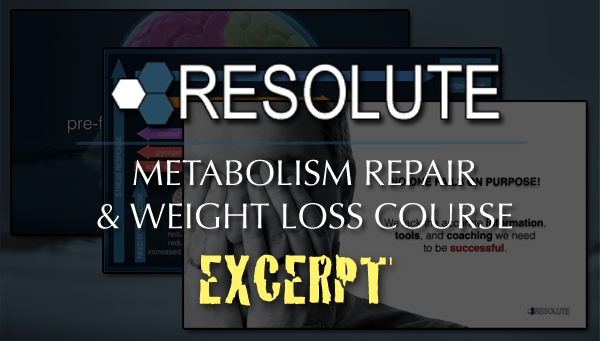Building on a previous lesson, we need to take a more in-depth look at the stress hormone cycle and its effect on energy and metabolic stress.
As the stress load increases, so does the need for glucose. But if the glucose needs are not met the result is an increase of adrenaline to help move the stored glucose from the liver in the form of glycogen.
But if a person has a low metabolic rate, and they have a deficiency in glycogen, then the adrenaline will move free-fatty-acids instead.
And now the production of glucose comes from cortisol at the expense of muscle tissue and the thymus gland.
As the muscle tissue is broken down certain amino acids cause further suppression of the metabolism.
This stress on the thymus gland also weakens the immune system and is one of the ways low metabolic rate and chronic stress contribute to frequent colds and other illness.
So if you have a low metabolism and you are low in glucose then eating a food that causes a cortisol response may actually make you feel good. But overtime it may cause wasting of the muscle, sexual problems, and mood problems.
Serotonin is an adaptive stress hormone. When we hear of serotonin we usually think of the brain. However, 95% of the serotonin in our bodies is produced in the intestine.
One of the sympathetic nervous system responses to stress is to reduce blood circulation in the extremities and the intestines. This is great if there is physical danger and we need to run away because right then we do not need to be focused on digestion.
But the effect on the intestines is that it causes poorly digested food, excess serotonin, and inappropriate levels of bacteria. This leads to increased permeability of the intestine and allows substances to enter the bloodstream.
One of the substances that enters the blood stream in this manner is a bacteria called endotoxin. This is normally detoxified in the lungs and liver. But is this situation, it burdens the liver and inhibits efficient thyroid T4 to T3 conversion.
It also further increases serotonin production reducing the livers ability to deactivate estrogen.
Usually when we hear about estrogen it is in reference to female reproduction. However, estrogen is a shock hormone. Women do naturally have higher levels of estrogen however, many things may cause an increase in estrogen production such as poor nutrition, stress, low thyroid or inflammation.
Excess estrogen wastes nutrients, effects glucose metabolism, inhibits the production of thyroid hormones, increases serotonin, and can increase prolactin and progesterone.
Estrogen and progesterone imbalances may contribute to weight gain, migraines, menstrual disturbances, endometriosis, fibroids, ovarian cysts and breast cancer.
Prolactin is most often referred to in its capacity as a regulator of milk production. However, it is also an adaptive hormone secreted during stress or pregnancy. Prolactin production may be increased by estrogen or serotonin. It suppresses the thyroid, and can lead to hair loss in both sexes.
Aldosterone regulates water and salt balance in the body and may contribute to a variety of inflammatory disorders. Cortisol, estrogen, and serotonin all increase the levels of aldosterone causing edema, especially in the legs, high-blood pressure, and the loss of sodium, magnesium, potassium, and calcium.
Adrenaline, cortisol, serotonin, endotoxin, estrogen, parathyroid hormone, and aldosterone suppress the metabolic rate and promote inflammation. By now we hope you are starting to understand why the immediate action to stress involved glucose, not just to reengage the prefrontal cortex of the brain, but also to help disrupt the hormone cascade. Remember this whole series of events initiated with a stress load that exceeded the bodies available glucose.
But what happens in the brain when our stress load exceeds our available glucose? The amygdala sees this state as cause for the fight or flight response and takes over. This means it short circuits the prefrontal cortex and inhibits our logical thinking.
This is an excerpt of the RESOLUTE online weight loss and metabolic repair course inspired by the work of Dr. Ray Peat, Dr. Broda Barnes, Dr. Brene Brown, Dr. James Prochaska, Dr. Martha Beck, Dr. Judith Beck, and Dr. Hans Selye.
Taiso Fitness and Nutrition
If you are looking for a shared personal training experience try Taiso Fitness and Nutrition. We are Tacoma’s fitness and nutrition gym for people who want to get out of pain or improve performance, who need immediate, measurable results, and want to make educated decisions to take control of their health.
Shared personal training provides the coaching of a personal trainer with the social support of a bootcamp style class.
Set up a complimentary consultation, or start a 21 Day Risk Free Trial. Stay up to date on the latest information through our website at www.taisofitness.com
Looking for an online course to help lose weight by repairing your metabolism and lowering your stress? Try RESOLUTE The Step-By-Step Program for People Who Want To Repair Their Metabolism.

